Breath Prayer | Prayer Series
What is prayer?
For some, it may seem like this practice is reserved for pastors or your auntie or tia or tita who never fails to bless every meal you share together.
Or maybe it looks like something you learned in Sunday School or at a campus ministry -- how to journal and read the Bible together. Perhaps the only time you feel like you pray (especially out loud) is at small group or church, and even then some of you may squirm and avoid eye contact with your leaders until they inevitably volunteer you to pray for the group.
"Prayer" according to etymonline.com, a website about etymology (the origin of words and their changes over time), came to us via French from the Latin root word meaning, "to ask, request, entreat."
And here we encounter the limits of English! This is what most people deem "prayer" to be, and it shows. Much of the focus of prayer falls on the speaking, entreating, even begging to God. It's us speaking TO God. And this is very important! It is a profound beauty that God is a God who hears and lovingly receives our cries.
But how many of you know that prayer is also, listening, sitting, being with God?
Over the next few months, we want to share some helpful articles inviting you into a more contemplative time of prayer with God.
We hope this blesses you and encourages you on your journey with the Lord.
Breath Prayer
Imagine yourself on a typical day.
You probably wake up to some obnoxious noise, like a buzzing phone alarm or perhaps the tugging of your little ones. Maybe you pry your protesting kids from their nice warm beds in order to get them to school or daycare or grandma's in time for you to get to work. And maybe you have your earbuds in as you walk in to work in an attempt to prepare yourself for the day. And work comes with its own demands -- customers, bosses, coworkers, or frantic emails vie for your attention.
We're only half-way through the day, and it's gotten undeniably noisy and full; maybe even overwhelming.
Maybe you used to be able to spend time with God through journaling or prayer, but you often feel like you don't even have time to think.. much less sit down and engage with God these days.
Maybe all you feel like you can do is breathe.
Breath Prayers have been a part of meditative spiritual practice for ages with roots in church tradition and is now seen analogously in counseling practices to combat anxiety.
Often, breath prayers connect short phrases from Scripture or your own heart by breathing in the first part of the phrase and breathing out the second part. We're usually so busy that slowing down is difficult, but taking long breaths in, holding it, and releasing these breaths naturally help us wind down.
The words "breath" and "spirit" are the same in the Hebrew text (ruwach, רוּחַ) as well as in the Greek New Testament (pneuma, πνεῦμα). Think of this prayer as embodying the presence of the Holy Spirit and allowing yourself to worshipfully breathe instead of, say, singing or dancing or other practices more typical in a Western service.
A simple breath prayer could look like this:
- Close your eyes and invite God's presence into this moment
- Acknowledge any distractions that my be vying for your attention and give them to God for these few minutes ("Lord, I admit this is distracting me, but I give you my thoughts and needs right now. Spirit, enable me to connect with you in this moment.")
- Breathe in for four seconds and pray in the first part of the verse or phrase ("Loving Father")
- Hold for four seconds
- Breath out for four seconds and pray the last part of the verse or phrase ("I need you today")
- Repeat this prayer for five minutes, paying attention to your breath and body that God has blessed you with. The goal is not to rush or get to the end, but to be present with God in this moment.
- As you pray, be aware of God's presence with you. Relish in that. Maybe even pause your words, and simply breath, listening to what God could be saying to you. He may use a feeling or a word or a picture. But if not, it's OK to just be still and present.
- End by thanking God for this time and asking for His presence to go with you as you re-engage with your day
"Be still and know that I am God" (Psalm 46:10)
The Psalmists recognized the vitality of stillness in knowing God. By connecting prayer with your physical rhythms of breathing, you enable the Lord to connect with your body, where we often store stress. It's amazing to see how God created our bodies and how something this simple can help us connect with Him!
You may not have an hour to journal, but this is something that you could practice for five minutes during your lunch break, while commuting on a train, or when stuck in traffic.
As you practice this, try extending your time to 10 or 15 minutes. This could be a beautiful way of resting in the Lord instead of going to YouTube or Facebook or Netflix for that peace that we all need.
Be blessed!
Thank you always for your support and prayers for the Chicago Navigators.
"Lord, Help Me Move"
Niwana Johnson hurls her fists. She shoves. And then she starts running.
She sprints away from the two women she had been fighting, heading for asphalt. She leaps into the street. She doesn’t see the car, but she feels it.
The impact sends her careening into the air. Bystanders say she flew 20 feet high.
Niwana doesn’t quite black out. It’s more of a white out.
The floating sensation, the bright light, a crazy sense of calm, all those things people talk about feeling when they die. All these sensations bathe Niwana.
The next thing she hears is the beep of machines monitoring her pulse and oxygen levels. She feels the starchy sheets, smells the sterile cleanliness of Mount Sinai Hospital on Chicago’s West Side, a 319-bed facility next to Douglas Park.
And then she realizes she cannot move.
This is her cry-to-Jesus moment, one of many in a life that has seen a drug treatment facility 29 times. But this time, she thinks, she really means it.
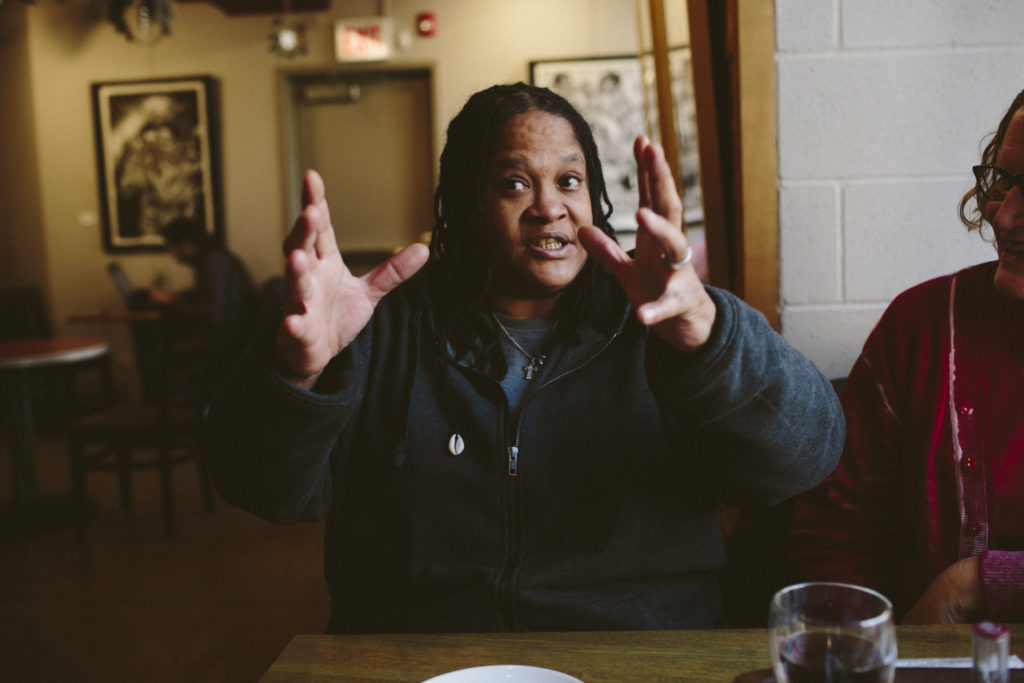
Help me move, God, Niwana pleads inwardly, and I will follow you.
Meanwhile more than 900 miles away, Nan Miller prays, too: Lord, I will follow you. Help me move.
She can no longer hide the effect her husband’s verbal and emotional abuse has had on her and her two sons. Nor the effects his secret life has had on their shared ministry as Navigators.
She has a friend who offers her and her boys, who are 6 and 8 at the time, a place to stay. They’re in Central Illinois, away from the home she shared with her husband in Florida, in a place where Nan could find community and support and a church.
This place in downstate Illinois, a village of a little more than 16,000 people called Morton, felt familiar to Nan, a lot like the rural area where she grew up. She packs a few bags and leaves with their sons in a desire to find honesty, health, and wholeness for her family. Believing God can still use her life, she begins to lead a Bible study in Morton with 7th-grade girls. She stays with them all the way through high school.
Later, she would uproot herself completely, driving two-and-a-half hours northeast to Chicago, from cows and cornfields to streets and skyscrapers.
She would settle in the North Side neighborhood of Uptown and start another Bible study in a building by Lake Michigan. Three years after she began, Niwana would walk into the room.
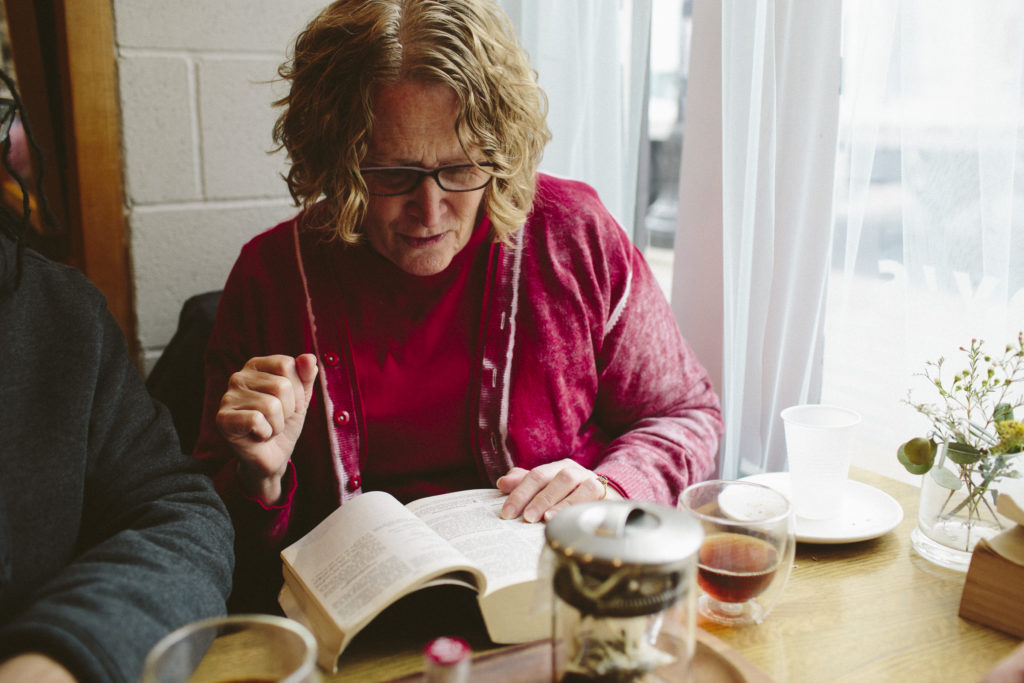
Born a decade earlier than Niwana, Nan, now 62, grew up on a farm on the outskirts of Yorkville, a small city in rural Illinois.
Her family had deep roots in the area, tracing their ancestry there to pioneer days. She joined a 4-H club. She grew up going to church.
But around 16 years old, she discovered “road drinking,” which she engaged in without inhibition.
“You go out to a country road, and you stop and just drink in the car,” Nan says. “Someone would have a bottle of wine, and just pass it around.”
Niwana looks at Nan as she recounts her childhood, her espresso-colored eyes agape, and says with disbelief, “Nan! I just can’t picture that!”
They sit together at a table in a café in Uptown called Everybody’s Coffee. A series of woodcuts and lithographs by a Virginia-based artist named Steve A. Prince hang on the walls. He has named his exhibition “Sankofa: Rebirth.” Sankofa is a West African phrase roughly meaning “go back and get”— a journey that embodies the concept of reaching backward while moving forward.
The black and white woodcuts depict celebrations of black life and the history and trauma wrought upon black communities. They embrace the merging of the past and the present, and they feel extra poignant as they surround Nan and Niwana, given where God has taken both of them, of how He has saved them despite their pasts, and of how they are still becoming who He has called them to be.
For Niwana, just the act of breathing—of being—makes her cry.
She takes off her glasses and inhales as the tears come.
“I’m alive,” Niwana sobs. “I just thank God for breath.”
She still bears somber scars from the culture in which she grew up, where fistfights and questionable influences pervaded Niwana’s life—including drugs.
Cocaine. Heroin. Weed.
“I was a crack head,” she says. “I smoked weed. I did it all.”
She first remembers selling drugs at 13 or 14 years old.
“Being in that environment, that’s all I knew,” she says. “That’s how I made my money. And that’s how I became my own best customer. You gotta see what your merchandise is about. That was my mentality back then.”
Her long dreads swung as she talked, some of the tips woven into small ivory shells.
“I was sneakin’ and creepin’,” she says. “I did a lot of things for drugs.”
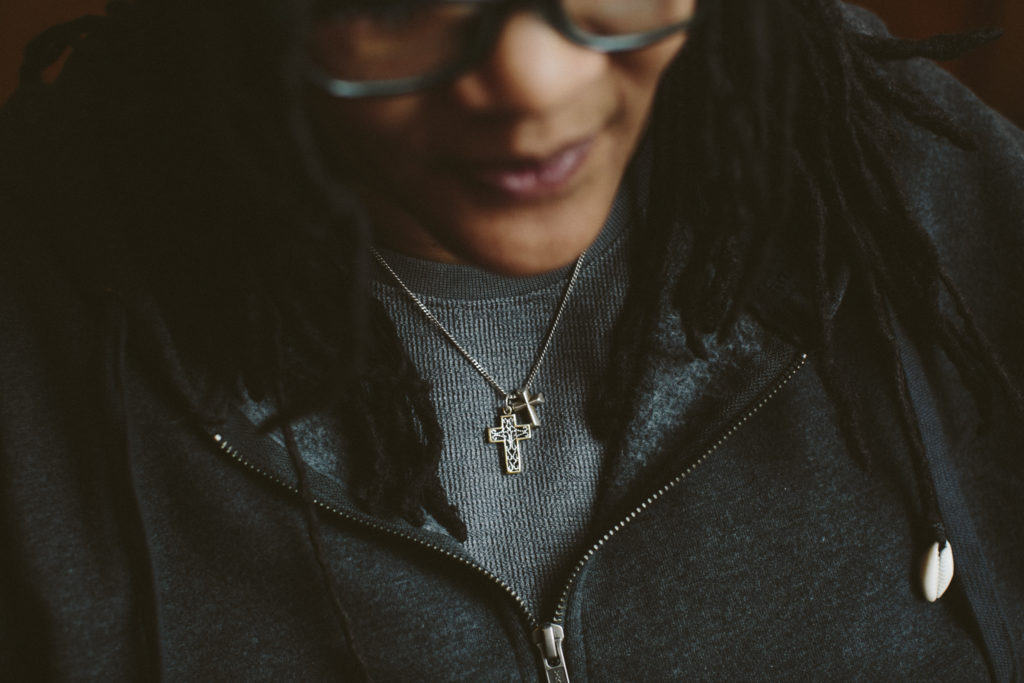
She keeps a small silver circle on the fourth finger of her left hand and a tiny cross on a chain around her neck. She bought the jewelry when she came into a mound of cash through her dealing, before she wasted the rest of it on drugs. She wears these accoutrements to remind her of where she was, so every day she can see how far God has brought her.
A few years before Niwana started dealing drugs, Nan enrolled in Illinois State University in Normal, a city in downstate Illinois.
After moving away from home, Nan says she lost the things—like family, church and routine—that had grounded her.
“I landed on a floor of girls that really liked to party,” she says. “I just started in with all that.”
She tried to do it all, hitting up the bars ‘til late and then trying to wake up for 8:00 a.m. classes.
“A hangover ain’t no joke!” Niwana interjects knowingly.
Then, Nan got mononucleosis, and the school sent her home to recuperate. There, as she fought to recover, she prayed, “God, I’m so sick of my life, and I don’t want to live this way.”
In return, she heard silence. Nothing. Like praying to a brick wall, she says. And yet.
After returning to school, Nan discovered a senior named Judy had moved onto her floor while she had been sick.
Judy befriended Nan, which made Nan think, “Whoa, I don’t know why she wants to be my friend.”
“That’s how I felt about you!” says Niwana, turning to Nan.
Nan smiles, continuing her story. She invited Judy to a party, but Judy declined, saying she was a Christian. Later that night, Nan would make her way back to Judy, saying, “I’ve been trying to find someone to tell me how I can get to know God.”
Judy started drawing on a piece of paper, sharing the gospel with Nan through an illustration Nan still has more than four decades later. Later, Nan realized Judy had written down a wrong Bible reference, “but it didn’t matter because I was really searching for God.”
That’s how Nan met Jesus, and one week later, Judy invited Nan to a Navigator Collegiate conference that included a Scripture-memory workshop.
Wow, Nan thought to herself. People my age are actually taking the Bible seriously.
“Eventually, I figured, ‘Hey, what Judy did with me, I can do with somebody else.’ I could help them get to know Jesus and help them start to walk with the Lord.”
By the time Niwana walked into Nan’s Bible study seven years ago, both their lives had taken several swerves.
After graduating college, Nan began women’s ministries and collegiate work with The Navigators. She met a man who became a Christian in the U.S. Navy. He had come to her campus on the GI Bill. He also toted a list of qualities he wanted in a wife and told Nan she fit every one of them—except she couldn’t sew.
Nan had been praying about a potential husband, but she had also been feeling a call to go overseas with The Navigators. She spent that summer in Japan.
“I came back, thinking I was going to break up with him because I really loved being overseas,” says Nan, “but instead, I got convinced otherwise, and we were engaged in November.”
They married in May, despite some of Nan’s concerns about him, and had two sons, moving around the country to serve with The Navigators.
Over the years, Nan’s concern grew into alarm. Her husband’s episodes of anger escalated into unpredictable rage. Interventions were tried but didn’t help, and eventually, Nan moved her sons away from the toxicity of their marriage and into her friend’s house in central Illinois.
Meanwhile, Niwana had been doing her dealing among familiar city blocks, unable to kick what had become a lifelong addiction. She had been shot at, stabbed, jumped, and beaten. Scuffles, violence, and drugs swirled around her.
Through it all, she had a daughter and a son. Then one day, about 13 years ago, Niwana got the news her daughter had received a stellar report card, and she dropped by the corner store for some “zoo-zoos and wam wams,” a reference to snacks and treats. On her way out, Niwana says two women she knew from the neighborhood tried to rob her. A fistfight ensued. She ran.
And then the car hit Niwana.
When she’s in the West Side now and passes by Mount Sinai Hospital, Niwana still looks up at a window on the third floor where she spent so much time, regaining feeling in her legs and learning how to take steps.
For years, she kept her crutches under her bed.
“You heal my body,” Niwana had told God in the hospital. “And I’ll serve you.”
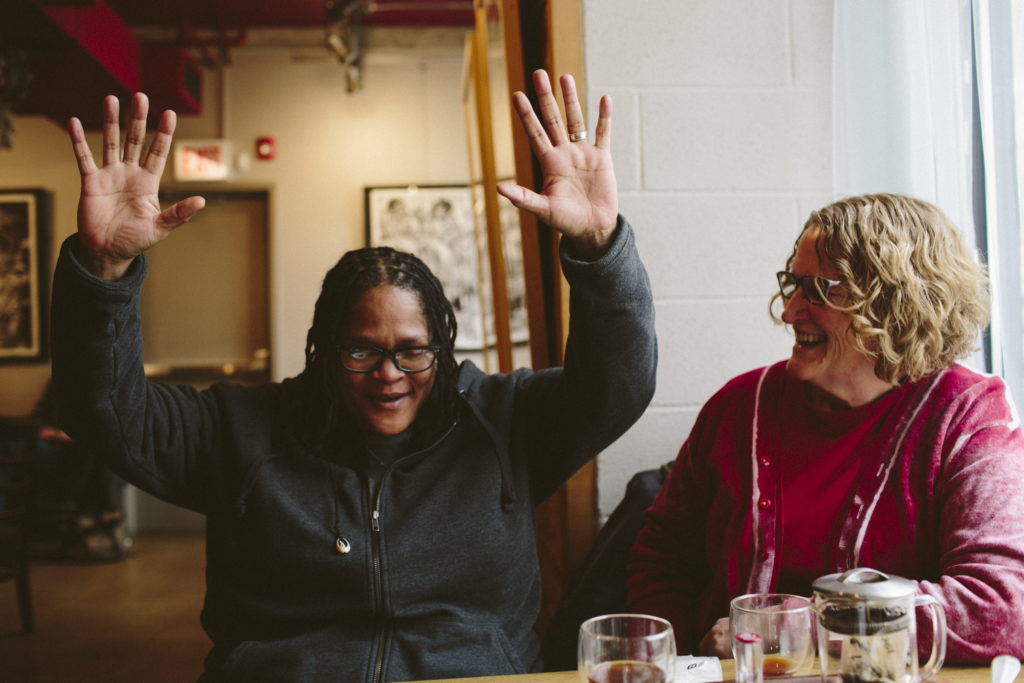
God did his part. Niwana couldn’t quite do hers.
Desperate for drugs, Niwana went back to her spot on a West Side street and stayed there for two days, getting high—with a collapsed lung.
But when she had no place to go, homeless for the third time in her life, God took hold of Niwana.
She made her way to Breakthrough Urban Ministries and went through its programs. Breakthrough staff set her up with housing in Uptown, in the building where she met Nan.
At first, Niwana would sit as Nan made her way through the Gospels with the small group of women, not saying one thing.
She took it in, wanting to learn but feeling a little suspicious, too.
Drugs had become her life, but she had also grown up around a church tradition, too.
Niwana remembers the times she had tried to get clean, when staying sober for three days seemed like the biggest accomplishment. During those times, she tried to attend church, sensing she needed God.
When she did, she felt people’s eyes on her. She felt judgment—judgment about what she wore, who she was, what she did. Like she could never be enough.
And so she left. She went back to the drugs, to the wandering, to the homelessness.
But at some point, she felt it from her core: She wanted to change her life. If she didn’t, she thought, it would be the greatest of insults.
“After I got hit, and God healed my body, I took it for granted,” she says. “I was homeless again. But God has brought me too far. He’s blessed me to not be another statistic. He delivered me, and He freed me, and that was like me pimp-slapping God in the face.”
Nan had moved to Chicago in 2004 and stayed after taking a 24-hour walk through the streets with fellow Navigator Larry Hope, deciding she had heaps to learn from Larry, from books, from the city, and from those she saw out in the night. And from Niwana.
At Nan’s Bible studies, Niwana began to say more, to share more. Nan knew Niwana was really serious when the study moved a few blocks and nearly all the women, some of whom were not yet clean from drugs, fell away.
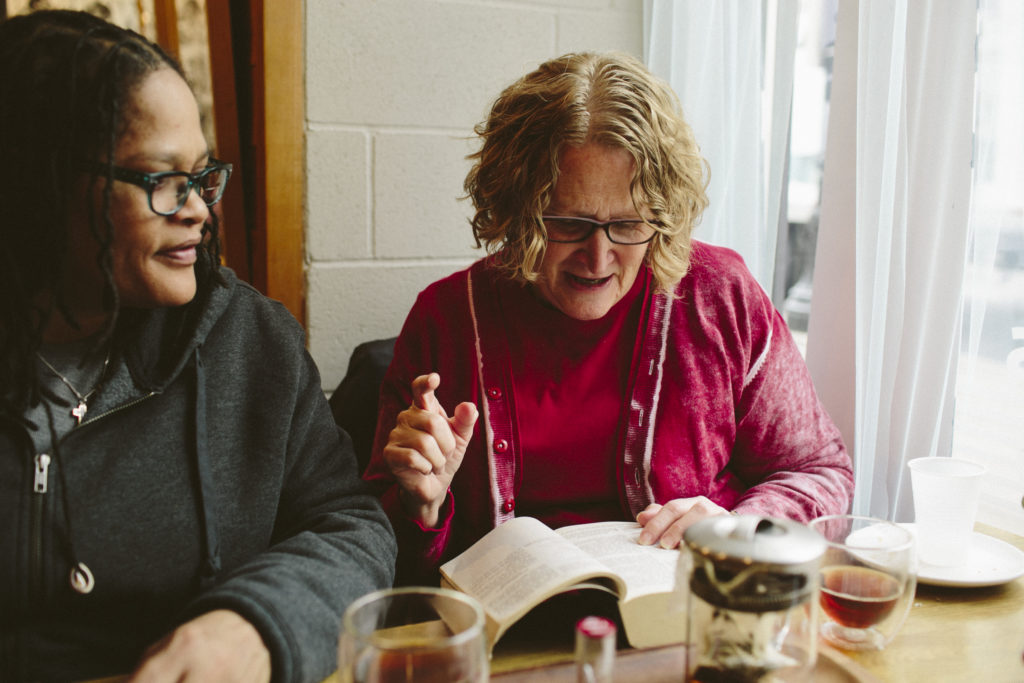
Nan introduced Niwana to Edgewater Baptist Church, where Niwana found a community of believers who did not judge her, who embraced her for who she is. She participates as a member there now, and she serves the church annually as a high school camp counselor, taking great joy in sharing her story and all God has done.
Nan now serves as the city leader for Navigators I:58 ministry, which engages with communities in growth and rebuilding efforts. When she moved recently to Little Village on the West Side, away from Niwana’s North Side neighborhood, the church community helped Niwana realize she still had friends who would love and surround her.
Even though Nan has moved, every other Wednesday, she still shows up for Niwana. And Niwana shows up for Nan.
They have done this for the past seven years, and this month, they do it again, working their way through the New Testament.
Since they met, Niwana has had another surgery and experiences discomfort while walking, but she has stayed away from drugs. When the pain feels awful, she’ll go to Nan, who keeps a few aspirin pills for her.
Last year, Nan and Niwana took a van to Cincinnati together to attend I:58’s national conference, one of the few times Niwana has been out of her familiar neighborhoods.
When they visited the Underground Railroad Freedom Museum, Niwana photographed a Bible belonging to people who had been enslaved.
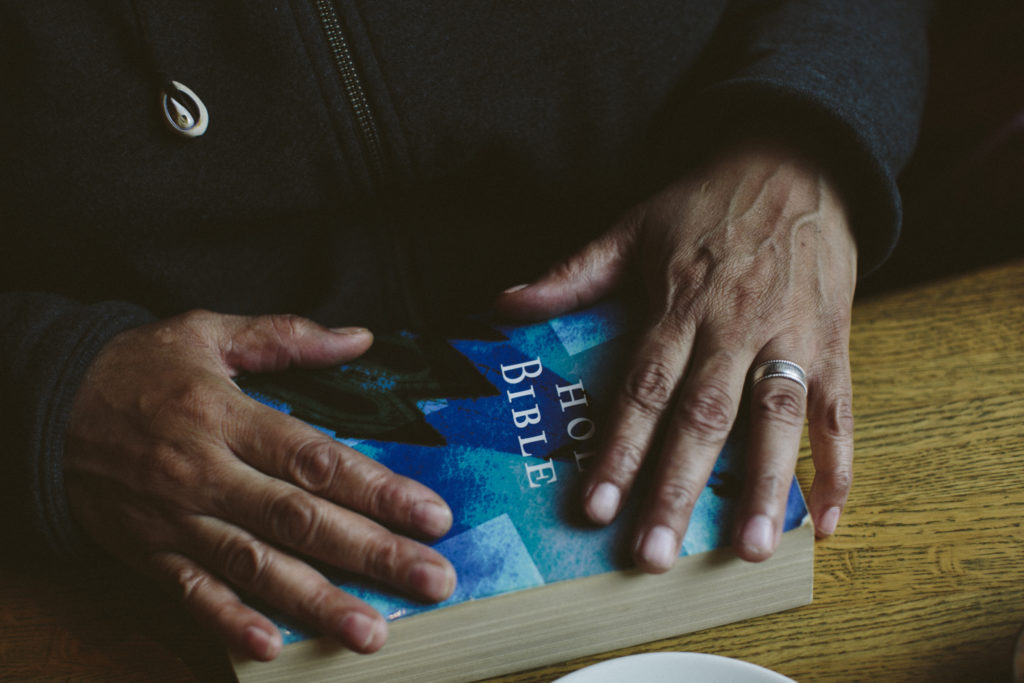
“If they took that big Bible around,” she says, “I can tote mine around.”
Niwana has a nickname for Nan, one Nan loves because it signifies Niwana sees her as family: Lil’ Miller.
“You know what? Niwana says. “Lil’ Miller—she is my home girl.”
Through the years, their relationship has become more mutual, with Nan coming to Niwana, too, and sharing through hard times, like her mother’s illness.
“It can take one person that God brings in your life, who puts your booty on fire, like ‘I got to move!’” Niwana says, looking at Nan. “I didn’t think that was true until you came.”
On a recent Wednesday, they read through Titus over Chinese Breakfast tea and pastries at Everybody’s Coffee, a café opened by Jesus People USA Covenant Church, a Christian communal living community.
The artwork depicting Sankofa surrounds them, an echo to reach back in moving forward.
Niwana rubs her fingers over a second, newer cross she wears, a silver and gold one. It lays next to the one she bought with drug money.
She bought it “to remind me that I’d rather have Jesus than silver or gold.”
It symbolizes this new era of her life, one that saw her daughter graduate from college and become an art teacher, one in which Niwana has stayed eight years clean, one in which she wants with all her being to serve God and others.
“Anything concerning the Lord, I want a part of it,” Niwana says. “I don’t have a lot to give, but I have me. I have my testimony. So all right, Lord.”
Nan pats Niwana arm.
“I have a new phrase for you,” she tells Niwana. “You want to hear the new one?”
“‘I am not what I do,’” Nan says, “‘I am not what I have. I am not what others think or say of me. I am a beloved child of God.’ That’s a paraphrase, from a guy named Henri Nouwen.”
Niwana and Nan put their arms around each other.
“She’s stuck with me,” Niwana says, her eyes twinkling.
They hug and their heads fall together, purple glasses next to green, black dreads mingling with blond curls. One from the city, one from the farm. One called out of addiction, both called out of abuse. Two moms. Two friends. Two stories, forever merged because of Jesus.
Erin Chan Ding is a freelance journalist with the Chicago Navigators.
Colleen Brinkmeier: "Only God Brought Me Through"
Around 7:30 a.m., inside a brick house on the corner of Kimbark and Kenwood Avenues on the far South Side of Chicago, Colleen Brinkmeier gathers at a table with Debra on a recent Tuesday, just as they do every morning.
They pull out their Bibles, and each has brought with them a devotional, from which they’ll share a passage with one another.
A block away, 87th Street bustles with a Cash 4 Gold store, a seafood shop and a deli. Several blocks west of the house in this city of neighborhoods lies Chatham and several blocks east stands South Chicago. Both Chatham and South Chicago have reputations as two of the more notorious areas of Chicago’s South Side.
But here in Marynook, a tiny hamlet nestled within the Avalon Park community, there are houses like this modest brick one-story home, most of them built in the post-World War II-era. The streets stay quiet and tranquil.
This, after the tumult of Colleen’s life before a four-year stay in prison, is exactly what she wants right now. This is Bridge to Freedom.
The house on Kenwood contrasts the old Bridge to Freedom apartment in Chicago’s Austin neighborhood on the West Side, which records the most violence per capita in the whole city. In the organization’s apartment there, on Central Avenue, noise prevailed at all hours. A bullet once flew in and lodged itself in the bathroom wall while Colleen was home. The police said they preferred to leave the bullet in the wall.
Bridge to Freedom, founded by Mica Garrett, a Navigator who was herself twice incarcerated, functions exactly as the name sounds: It’s a link for the formerly incarcerated between prison and total freedom. It’s not a halfway house, though. It’s completely voluntary; applicants go through a process to get accepted and agree to an all-encompassing faith component that includes morning devotions and weekly church attendance.
The first floor of the Marynook home contains three bedrooms and two bathrooms for the women in the program, and the basement level is laid out the same way for the men. A tone of respect laces through everyone’s language as they address each other: Ms. Mica, Ms. Debra, Ms. Colleen, Mr. James, Ms. Julie, Mr. Henry, Mr. Peter.
Born in 1962, Colleen grew up on a large farm in a small town called Fairdale in rural Illinois, about 90 minutes outside of downtown Chicago. Her closest neighbors lived a half-mile to a mile away.
“We had all the animals,” she says. “I knew how to do it all.”
The fourth of five kids, Colleen and her family raised beef cows, dairy cows, pigs, and chickens. They plowed. They grew corn and peas and wheat.
But in 1999, the jail and prison sentences for Colleen began. They started out short, in connection to things like stealing and petty theft.
She talks about being stuck in a rough, two decades-long relationship with the father of her two sons. They lived in Rockford, about 90 miles outside of Chicago. In the beginning of the relationship, she says he grew verbally and emotionally abusive. Toward the end, the abuse got physical.
In the middle of their time together, Colleen says she got caught stealing something for her boys, Joey, now 26, and BJ, now 31, and served a six-month jail sentence. Later in her relationship with her kids’ father, Colleen suffered a miscarriage so severe she needed a total hysterectomy.
During her stay at the hospital, Colleen says, her ex-boyfriend “literally moved me out of the house.” He found her an apartment, paid one month’s rent and left her and the boys on their own.

It didn’t turn out well. In the next several years, Colleen was caught committing public aid fraud and spent three more stints in jail. Things got really bad around a decade ago, when, she says, “I got caught up with the wrong people.”
The group in Rockford would steal checks and cavort around suburban Chicago, visiting big box stores like Walmart, K-Mart, and Home Depot, writing stolen checks for merchandise and re-selling the goods.
In September 2009, she told the group she would write one final check for one more batch of stolen Walmart merchandise, and there would be no more.
“I just had that feeling,” she says. “I was done with the group.”
And yet. Five months later, she got a call from her ex, saying the police had shown up looking for her. It turns out the check she wrote at Walmart was stolen from a judge’s wife; police had caught Colleen forging the stolen check on video surveillance.
Colleen got scared. She ran. She left Rockford, heading to Springfield for five months and staying with a friend. Another friend convinced her to head to Las Vegas, but to do so, she had to go back through Rockford. She booked a bus ticket that took her through Rockford, texted her best friend she was heading over, and she says when she showed up at the bus station, “police were everywhere you could imagine.”
She was sent to Logan Correctional Center for a year, and then spent three and a half years at Decatur Correctional Center. At the same time, her two sons had received a prison sentence for arson. Her whole family was incarcerated at once.
Her inmate number—R36357—followed Colleen around from prison to prison.
At the time, Colleen says, “I was still rebellious. I was still mad.”
Life at Decatur, she says, felt so hard. For health reasons—a hernia and respiratory issues—she couldn’t perform a job. She received $14.70 a month. She heard from her sons over the phone every couple of weeks. Sometimes, they wrote her letters. Some women in the prison treated her with kindness, every so often offering her an extra bag of noodles.
One day, a few weeks after arriving at Logan, she read in the newspaper that a 67-year-old man had been killed in a home invasion. Later that day, she got a call from the jail staff asking her how to reach Jim, the man she had been dating at the time. She realized the murdered man had been Jim.
She was shocked. She immediately went into grieving, helped by a counselor at the prison.
“Some say it was a blessing that I was incarcerated [at the time of the home invasion] because who knows what would have happened if I would have been there, too,” she says.
Jim’s death also ruled out one of Colleen’s options for where to go after she finished serving her sentence.
As she processed his death, figuring out how to occupy her time in prison took the largest toll on Colleen.
She attended a church service every other Saturday. She joined a few Bible studies. She signed up for Bible classes in the mail. And in those long stretches during the day, she got curious about the Bible itself.
She would take a Bible into the day room of the prison for three to four hours at a time. Colleen had a system: Write down the first verse of a book of the Bible. Flip to the last chapter of the book. Write down the first verse of the last chapter in the book. For single-chapter books like I John, Jude, and Philemon, she devised a different method of writing verses. She wrote down verses for every single book, even obscure ones in Nahum and Numbers.
When she finished, she would start with the first verse of the second chapter of a Bible book. A prison guard there who also served as a chaplain challenged Colleen to memorize Romans 8:28, his favorite verse: “And we know that in all things God works for the good of those who love him, who have been called according to his purpose” (NIV).
So she wrote it down, and when they saw each other, she recited it.
In November 2014, at a semi-annual re-entry summit at Decatur, Colleen met Mica, the Bridge to Freedom founder, and Debra, who served as the program director for Bridge to Freedom for the last seven years and also lived with the women in the house.
A friend Colleen had met in prison, plus the prison counselor, pushed her toward them, reminding Colleen she’d be on the outside in three months with no place to go. Nearly everyone else told her not to go to Bridge to Freedom.
“You don’t want to go there,” she says they told her. “It’s a cult.”
Before they left for the day, Mica handed Colleen an application and asked her to fill it out.
“You’re coming to our place,” Mica told Colleen.
Colleen says her prison unit wasn’t happy about it, but she felt relief she had a place to go and wouldn’t be back in Rockford.
Then, in February 2015, for the first time in years, she changed out of her prison-issue blue pants and long-sleeved white shirt. For the first time in her life, she took a train, a Metra from Decatur to Union Station in Chicago, where Debra met her. She would become the first female graduate of Bridge to Freedom.

She looks back at her life then and now realizes how hard she made things for Debra and Mica.
“When I first came, I was a mess,” she says. “I took them through stages where they didn’t know what to do.”
She and Mica visited a doctor on the West Side who diagnosed Colleen with depression, anxiety and bipolar disorder. At one point, says Mica, who went with Colleen to all of her psychiatric appointments, Colleen’s doctor said she would need to be institutionalized.
“He said she was too far gone,” Mica says. “If he could see her now…”
Every Sunday, when they’d go to church, Colleen would dress in short skirts and shirts showing off her cleavage.
“They were too short for the place where we were going,” says Debra, “and I would catch her at the door and say, ‘No ma’am. You can’t wear that. We got to bring it down. Bring it down.’”
Three years later, everything has changed. Colleen sits on a couch at the Bridge to Freedom house’s living room dressed in a lavender blouse flattering for her shape.
“Now, she dresses very fashionable,” Debra says. “It’s beautiful.”
Her blonde hair falls around her shoulders, and her bangs have been neatly trimmed. She’s had a pedicure and her fingernails painted, indulgences she makes sure to enjoy regularly.
Of course, the changes go far beyond her appearance.
In spring 2015, Colleen had been riding to a picnic when she got sick. Really sick.
The driver had to stop and open the van door so she could throw up.
Doctors later told her she had been having a heart attack.
Several months later, in December 2015, she underwent a triple bypass heart surgery. Three months later, she was still at Rush University Medical Center, recovering. When she tried to go home once, she got an infection in her legs.
At one point, she medicated herself on prescription pain pills. It just hurt too much.
“I was in so much pain,” Colleen says. “Nothing was working. I was in so much pain, I even asked God to take my life.”
She watched television. She slept—a lot. She kept taking prescription pills.
“I didn’t really care,” she says. Then, “I went to Ms. Deb, and I said, ‘I need help. You need to take this medicine.’ Because it was taking over.”
God used those months, her darkest, weakest, most pain-filled moments, to draw Colleen close to Him.
“It was only God that brought me through,” she says. “Life just shined totally different. I needed to let the past be the past, and not take any more steps to go back into the past.”
Later that summer, Colleen got baptized at her church, Apostolic Faith Church in Indiana.
She’s still growing, still having morning devotions. On a recent morning, one study centered on exalting and praising God and another on doing small things with great love.
Bridge to Freedom funds itself in part by cooking and catering events, and Colleen helps cook for those. She also makes mac and cheese and scalloped potatoes and ham for her housemates on occasion.

On a couple of weekdays this January, Colleen headed with Debra, Mica, and Ella, who joined the house in December, to North Park University on the city’s North Side, dishing out the rolls, chicken, and lasagna they had prepared for a conference on Christianity and mysticism.
Like her, Colleen’s two boys are out of prison now, and she sometimes visits them in Rockford. Her dynamic with them, now that they’re both out and no longer on parole, remains a bit stilted.
“I’m still figuring out where I fit in,” she says.
In Bridge to Freedom, her role is clear: family. She considers Julie Beland, her roommate and former prison-mate—they served as peer educators at Decatur together, discussing health and hygiene with other inmates—her sister.
Colleen and Julie will stay up late, sometimes ‘til 1 a.m., just talking.
“She’s a wonderful person,” Julie says. “She’s my heart. She’s my best friend.”
Colleen has been at Bridge to Freedom for three years now. She graduated from the program last year, and she envisions someday renting or owning her own place or staying to serve others who come through Bridge to Freedom.
Colleen had looked at Debra like an older sister, gentle, wise and in many senses, her navigator.
And then, when Debra left Bridge to Freedom in February, Colleen started leading the morning devotions.
“Colleen has probably grown more than anyone at Bridge to Freedom,” Mica says. “She’s grown the most—mentally, emotionally, and spiritually.”
When Colleen first came to Bridge to Freedom, according to Mica, she couldn’t write a complete sentence. Then, Sierra Neuharth, the daughter of Jay Neuharth, the director of The Navigators in Chicago, began tutoring Colleen, and now she’s writing papers and studying for a bachelor’s degree.
Colleen, now 55 years old, has a dream for the rest of her life: She wants to become a prison counselor. When she and Julie left Decatur, they said there was one counselor for every 400 inmates.
Colleen wants to help right-size that overwhelming ratio, and she’s taking classes so she can go back to prisons like Decatur to counsel the women there. She has a couple of more years of her schooling left, but can already visualize her return through the barbed wire.
“When we go into prison, you’re always going through the back door,” Colleen says. “I don’t ever want to do that again. I want to be proud to walk through a front door and say I’m walking out that same door I came in on that same day.”
Erin Chan Ding is a freelance journalist with The Navigators in Chicago.
James Kang: A Heart for Asia
James Kang moves through Southeast Asia with alacrity and aplomb, wearing flip flops and weaving through the streets without fear, stepping in front of the ever-present motorbikes weaving past him—often hopping on one himself—and greeting longtime friends in just about every country.
James had grown a silver-flecked, ebony mustache for the first time just before a recent trip, and it delighted both friends and strangers. One man who worked for Air Asia, unknown to James, even stopped him at an airport to ask him to pose for a promotional photo.
“This never happened before I grew this mustache,” says James, his dark eyes dancing behind his glasses in a way that makes you think it actually did.
He looks much younger than his 60 years, and even more so in Southeast Asia, where his friend and fellow Chicago Navigator Mica Garrett, who accompanied him on a recent trip observes, “He seems more free here.”
Indeed, a large part of James’s heart resides in Southeast Asia. Born in Korea, James began working in the Philippines in 1987, leading short-term teams, and he hasn’t stopped traveling to various countries in the region since. James, who is on the leadership team for The Navigators in Chicago and former director of The Navigators Asian American Network, is also working to form a kind of sister partnership between Navigators in Chicago and one of the Southeast Asian countries where The Navigators serve (unnamed here to protect the sensitive nature of the work).
James talked about his life on a recent Sunday afternoon on the 23rd floor of the Eastin Hotel Makkasan in Bangkok, the city splayed out before him with its honking tuk-tuks, or motorcycle carts, and a plate of hummus and soft naan bread spread out before him. It was a bit of a respite during a vision trip he had taken with Mica and others from Bridge to Freedom, the Chicago re-entry program Mica founded for the formerly incarcerated. Seated on an outdoor balcony, James dives into his 30-year history with The Navigators, his hopes for the Southeast Asian region, and his sense of Asian American identity and the linkages inherent in it.
What centers you in your ministry?
Two passages drive me in my ministry in Chicago. One is Philippians 2, where the apostle Paul says that you should consider others as more important than yourself. The other is 1 Corinthians 6 and also in 12, where God has given different gifts to different members of the body for the benefit of the body, and not for individual benefit, but how it benefits every one of us.
When Jesus talked about sin and idolatry and all those things, it’s defined and motivated by self, where Jesus’ ministry was all motivated by His relationship with the Father. I spent about a year just reading the Gospels over and over again, and Jesus always talks about “not by me,” but “by the Father.” Everything was dependent on the Father, and His sense of self was almost nonexistent. I love that. I think, hopefully, this is where I can get to, and the way I do ministry is like that.
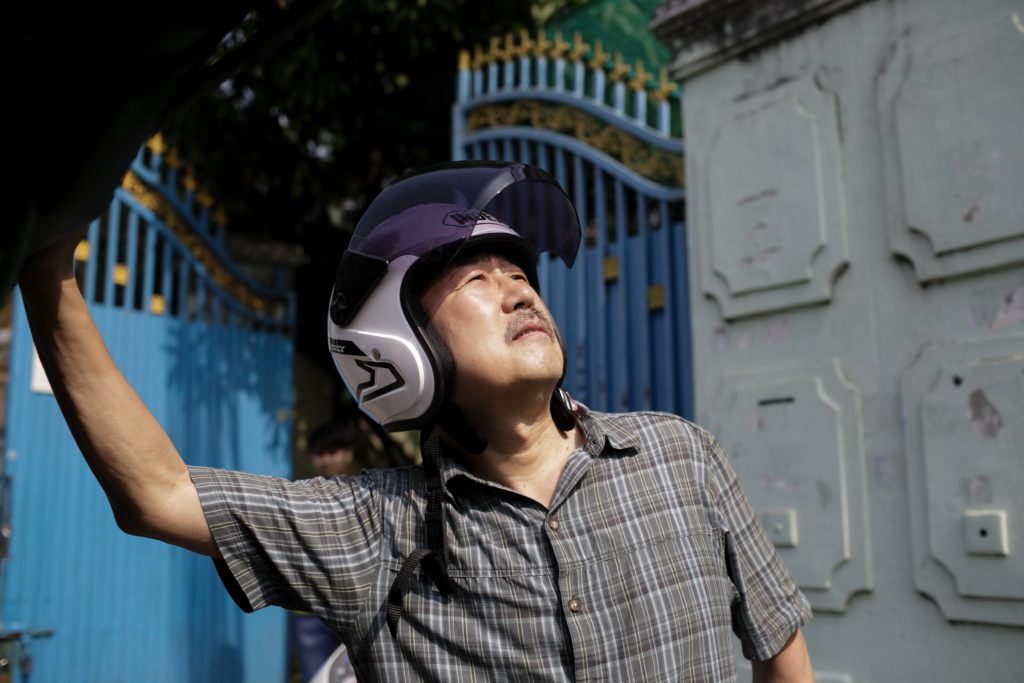
So there’s a tension I experience when I’m in the States—you have to have a strong sense of self and identity so that you can really give and minister outside of yourself and really love and serve in humility. Also, when I come to Asia, I hear, it’s not about self, but it’s about others. It’s about really considering the family, the extended family and other people around you. In Asia, they would say, my identity is based on what other people think of me or how they interact with me. In America, my identity is based on my responsibility or my accomplishments.
So in Asia their sense of self is really weak. At one of the classes I teach in Southeast Asia on international interviewing skills, I say, “Tell me about yourself.” They say, “I’m in school because my mom and dad sacrificed.” It’s all about other people. I say, “But tell me about you.” They say, “Well, that’s too selfish. Why would I want to do that?” It’s a very different context here. What I’m trying to do is really balance the differences. It’s really both our individual self and yet at the same time, I am really nonexistent without others because I am a part of the family, and I’m an important part of the Kingdom. That’s what drives me.”
What was your childhood like?
I was born in Korea and came to the States when I was 9, and lived in North Carolina, in Charlotte. The Presbyterian Church (U.S.A.) wanted my dad to practice English and writing more. So they sent us to a PCA-affiliated university in Charlotte, which is called Johnson C. Smith University. It’s an all-black university, so HBCU [Historically Black College and University]. So when we went there our housing was all black. The church and the school I went to was all white. So that was my first experience with the cultural dynamic differences. That’s why in ministry, 14 years later, I was drawn to ministry with African Americans. I was a volunteer chaplain at Cook County maximum security with Mica [Garrett], the Salvation Army halfway house, places like that. Because I really connected with the African Americans when I was growing up [in North Carolina].
Both my parents have master’s degrees, but I was really yearning for my own identity growing up, so I read a lot of books by Karl Marx. That was before I was a Christian. There was a book [by Robert Pirsig] on Zen and motorcycle maintenance, about yourself. I was really searching. So I quit school and because I was reading Karl Marx, and it was about working with your hands, I went to become a mechanic. I went to the University of Illinois at Chicago, and after one year, I quit. I worked two years as a car mechanic. The guy fired me because I wasn’t good at it. The only thing he let me do was oil changes. I then went to Loyola for school because my high school grades [at Gordon Tech, then an all-boys Catholic High School on the North Side of Chicago] were pretty good.
How did you become a Christian?
I came to Christ through my sister when I was 24. My sister, Ruth, and a few other people started the Asian American Christian Ministries at Northwestern University. She told me about a retreat, and I went to the retreat, and I came to Christ. I was at Loyola. This was 1982. That’s how I came to Christ, and got involved with Navigators at Northwestern for two years. I lived in an apartment on Foster Avenue by campus there.
How did you join The Navigators?
I got involved with The Navigators at Northwestern from ’82 to ’84, and then I went to Dallas Theological Seminary from ’84 to ’88. While I was in Dallas, I met my wife, Janet, in Oklahoma—my roommate was dating her roommate up in Oklahoma City.
While I was in Dallas, I joined Navigators staff and did my internship at Long Beach State. I wanted to do church planting out there in Southern California. It was the late ‘80s, and it was a lot of transition with a lot of new immigrants coming in. A lot of young people are having Asian American identities for the first time. It was a unique time.
I got connected with Navigators staff there, and they said, “Hey, why don’t you consider joining staff, and doing this here.” For Asians, it’s hard, you know, because we have to raise support. Initially, my parents were opposed to me raising support, but now they’re fully supportive.
What are your roles with The Navigators?
I wear three hats with The Navigators. There’s a smaller hat within the main hat. The first hat is I’m on the Chicago Navigators leadership team. The staff team is divided into three spheres, and I oversee sphere three, which includes Nations Within, Navigators Missions, and International Student Ministries. Other than that, [Chicago Director] Jay Neuharth gives me responsibilities like communications and the staff retreat.
The second hat I’m wearing is as a staff member of the Navigators Missions ministry. I’m on the national leadership team. I’m the director of the ethnic implementation team, and our role is to influence Navigators Missions staff-wide so we can recruit ethnic staff to go overseas. We have more than 300 staff with Missions. We don’t have a lot of ethnics on our Missions team, just a handful.
Under Navigators Missions, I also coach short-term team leaders who are going to Southeast Asia. This summer, I’ll be coaching three teams with seven team leaders. So I help with the logistics of connecting with local staff. Communicating with leaders here can be quite complicated. There’s so much cultural dissonance and misunderstanding. What people hear is not what they’re really communicating.
The third hat that I have is utilizing my connections, relationship spheres, to pioneer more summer and short-term, mid-term, and long-term missionaries to be in Southeast Asia.

What draws you to ministry in Southeast Asia?
Why not East Asia? Why not Korea, Japan, or China? Why Southeast Asia? I don’t know. I’m realizing, everyone, we’re all broken. We have broken pieces, all of us. We’re a mosaic of broken pieces, that’s who we are. In American evangelicalism, the thing that I hear all the time is, “God saved you from your brokenness, now move on, fulfill whatever God calls you to do.” So there’s a huge avoidance of our brokenness. If it becomes sharp, we blame others. There’s this whole sense of having my act together in America, moving along. God is powerful. God loves you. You know, go and do great things for Him.
The emphasis is not on how my brokenness can be healed and influenced by others but on my own. It’s about, “You’re great. God loves you.” I’m not panning Christianity [in America]. But here, in Southeast Asia, I’m realizing among Christians, as well, they accept their brokenness, they’re not ashamed of it. As shattered and as broken as they are, they really embrace it and allow God to use that to impact the lives of other people. So it’s less about them and more about others. And that’s what I love about being here.
When did you first get involved in Southeast Asia?
I started by traveling on a team in ’87 to the Philippines and came back in ’88. I brought students in ’92, ’94, and ’98 is when we started doing it every year. My wife was a huge, huge partner in this. Now that our son, Elliott, is grown, it’s easier, but back then, it wasn’t. Back then, I used to be gone four to six weeks because I was actually leading the summer teams, not coaching team leaders.
The generations are so different between then and now. When I first started doing this every year, students were born in ’78. Now they’re born in ’99, 2000. That’s a huge generational difference. One of the things I really want to do is, I want them to see how God works differently from where they’re from, how God works differently among other people and cultures and how other cultures and people are all equally loved by God. Because you could take the American culture or Christianity and try to impose that on them. But we need to see other people on equal footing as ourselves. Don’t see someone as lower than us—love people equally.
What keeps you coming back to the region?
I was talking to a Navigator here in Southeast Asia, and he said, “Well, all Navigator staff, we consider ourselves a family. But in America we have Navigator relationships, family, business, co-workers, then we have immediate family, and then we have close people we have fellowship with. Everything is compartmentalized.”
But here it isn’t. I love that. It’s not based on the benefit I get from you. Here there isn’t a clear line between working relationships and other relationships. Like, where does the line between co-workers and just caring for one another begin and end? One of the key staff in Southeast Asia and her husband, they called me in the middle of the night, “Are you okay? We heard you had a cough.” And they would drive on their scooter late at night to bring something for me if I am sick. It’s that kind of caring that’s different.
How does being Asian American shape your ministry?
Asian American identity is quite complex because in America, you have a spectrum of Asians who just came from overseas to those who have five, six family generations of Asian Americans.
Asians are very group oriented. From our family, we get pressure to be part of the collective, “What would other people think?” That’s how I was raised. For a lot of Americans, it was, “What do you care what other people think?” So it’s that cultural tension, and a lot of Asians we’re somewhere one foot in American culture, where we value America, we love America, we want to assimilate but there’s part of our value system that’s very group-oriented, which is reflected in why some people think Asians are not vocal or they’re passive, or they’re not strong leaders. Part of it is they’re very collective, so there’s that tension.
I would say the Bible talks about both identities, or realities, very well. Paul talks about everything as your responsibility, but at the same time, the “you” that he uses is very plural and talks about group responsibility.
I don’t bring the intimate answers or understandings of racial dynamics in America. But I think I’m able to see the big picture of how collaboration among culture and ethnicity is really important for us as a single body to glorify God.

How can we be praying for you?
If you could pray, what I know and what I think I know is not absolutely true as God sees it. It’s my reality. And I really want my reality, the way I see the world around me, you know, the way I see people and culture and stuff to be more in line with how God sees it. Because I can personify my own pet peeves and frustrations, anger, and agenda and all that and make it as though it’s greater.
And pray for my family. I love being in Asia, but I miss them.
What do you envision for your future?
I’m 60. I have six, seven years left until I retire. Even after that, I’ll still do ministry. If God allows me to continue influencing staff at home, in Southeast Asia—to see them catching a vision—I will be very thankful to the Lord for that. I’ll be very grateful.
James Kang: A Heart for Asia
Written by Erin Chan Ding
Photos by Kristen L Norman
for The Navigators in Chicago







